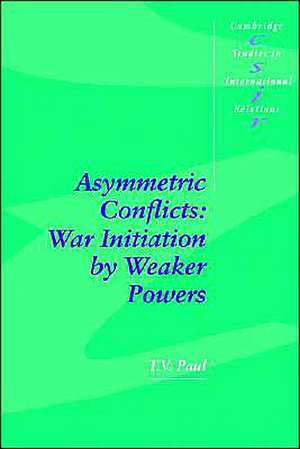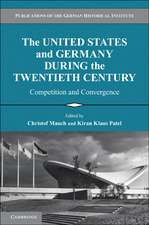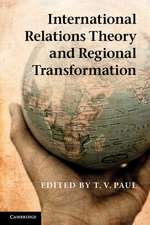Asymmetric Conflicts: War Initiation by Weaker Powers: Cambridge Studies in International Relations, cartea 33
Autor T. V. Paulen Limba Engleză Paperback – 9 mar 1994
Din seria Cambridge Studies in International Relations
-
 Preț: 200.78 lei
Preț: 200.78 lei -
 Preț: 190.01 lei
Preț: 190.01 lei -
 Preț: 198.89 lei
Preț: 198.89 lei -
 Preț: 210.69 lei
Preț: 210.69 lei -
 Preț: 200.85 lei
Preț: 200.85 lei -
 Preț: 232.37 lei
Preț: 232.37 lei -
 Preț: 237.58 lei
Preț: 237.58 lei - 8%
 Preț: 401.23 lei
Preț: 401.23 lei -
 Preț: 229.56 lei
Preț: 229.56 lei -
 Preț: 265.70 lei
Preț: 265.70 lei -
 Preț: 200.08 lei
Preț: 200.08 lei -
 Preț: 207.81 lei
Preț: 207.81 lei -
 Preț: 158.77 lei
Preț: 158.77 lei -
 Preț: 162.49 lei
Preț: 162.49 lei -
 Preț: 231.47 lei
Preț: 231.47 lei - 11%
 Preț: 584.77 lei
Preț: 584.77 lei -
 Preț: 241.77 lei
Preț: 241.77 lei -
 Preț: 287.87 lei
Preț: 287.87 lei -
 Preț: 209.12 lei
Preț: 209.12 lei -
 Preț: 299.22 lei
Preț: 299.22 lei -
 Preț: 286.13 lei
Preț: 286.13 lei -
 Preț: 287.87 lei
Preț: 287.87 lei - 11%
 Preț: 641.67 lei
Preț: 641.67 lei - 11%
 Preț: 585.78 lei
Preț: 585.78 lei - 14%
 Preț: 843.23 lei
Preț: 843.23 lei -
 Preț: 303.80 lei
Preț: 303.80 lei -
 Preț: 284.78 lei
Preț: 284.78 lei -
 Preț: 279.76 lei
Preț: 279.76 lei -
 Preț: 285.75 lei
Preț: 285.75 lei -
 Preț: 324.24 lei
Preț: 324.24 lei -
 Preț: 290.16 lei
Preț: 290.16 lei -
 Preț: 291.69 lei
Preț: 291.69 lei -
 Preț: 392.52 lei
Preț: 392.52 lei -
 Preț: 315.99 lei
Preț: 315.99 lei
Preț: 284.01 lei
Nou
Puncte Express: 426
Preț estimativ în valută:
54.35€ • 56.86$ • 45.14£
54.35€ • 56.86$ • 45.14£
Carte tipărită la comandă
Livrare economică 03-17 aprilie
Preluare comenzi: 021 569.72.76
Specificații
ISBN-13: 9780521466219
ISBN-10: 0521466210
Pagini: 264
Ilustrații: 2 tables
Dimensiuni: 152 x 229 x 15 mm
Greutate: 0.36 kg
Editura: Cambridge University Press
Colecția Cambridge University Press
Seria Cambridge Studies in International Relations
Locul publicării:Cambridge, United Kingdom
ISBN-10: 0521466210
Pagini: 264
Ilustrații: 2 tables
Dimensiuni: 152 x 229 x 15 mm
Greutate: 0.36 kg
Editura: Cambridge University Press
Colecția Cambridge University Press
Seria Cambridge Studies in International Relations
Locul publicării:Cambridge, United Kingdom
Cuprins
Part I. Theoretical Framework: 1. Introduction: war initiation in international relations theory; 2. Explaining war initiation by weaker powers in asymmetric conflicts; Part II. The Case Studies: 3. The Japanese offensive against Russia, 1904; 4. The Japanese attack on Pearl Harbor, 1941; 5. The Chinese intervention in Korea, 1950; 6. The Pakistani offensive in Kashmir, 1965; 7. The Egyptian offensive in the Sinai, 1973; 8. The Argentine invasion of the Falklands/Malvinas, 1982; 9. Conclusion.
Recenzii
"...an important contribution to the literature on the causes of war. Students of history and international politics should find the book accessible and provocative. Paul raises an important and timely issue that has received limited attention, and his contribution is certain to spark debate. The book serves as an excellent reminder that conflict processes are often complex and do not lend themselves to easy solutions." Martin Malin, Journal of International Affairs
"...the case studies are well presented, and the argument clearly put." Foreign Affairs
"Asymmetric Conflicts makes a valuable contribution to initiation theory by investigating a puzzling, yet recurring, phenomenon in international politics: the tendency of weak states to initiate war against stronger adversaries....[T]he case studies make a good read; they are structured around a consistent set of theoretically interesting questions and present a sensible understanding of historical events. Moreover, the author has conducted extensive research, including personal interviews with historians and participants....Paul's book studies a familiar question in a fresh light....[B]y bringing together a number of important hypotheses and carefully applying them to a specific set of cases, Paul's work advances our understanding of an issue vital to the study of foreign and security policy." Susan Peterson, Journal of Interdisciplinary History
"...the case studies are well presented, and the argument clearly put." Foreign Affairs
"Asymmetric Conflicts makes a valuable contribution to initiation theory by investigating a puzzling, yet recurring, phenomenon in international politics: the tendency of weak states to initiate war against stronger adversaries....[T]he case studies make a good read; they are structured around a consistent set of theoretically interesting questions and present a sensible understanding of historical events. Moreover, the author has conducted extensive research, including personal interviews with historians and participants....Paul's book studies a familiar question in a fresh light....[B]y bringing together a number of important hypotheses and carefully applying them to a specific set of cases, Paul's work advances our understanding of an issue vital to the study of foreign and security policy." Susan Peterson, Journal of Interdisciplinary History
Descriere
This book asks why weaker powers so often engage in wars against stronger opponents.














